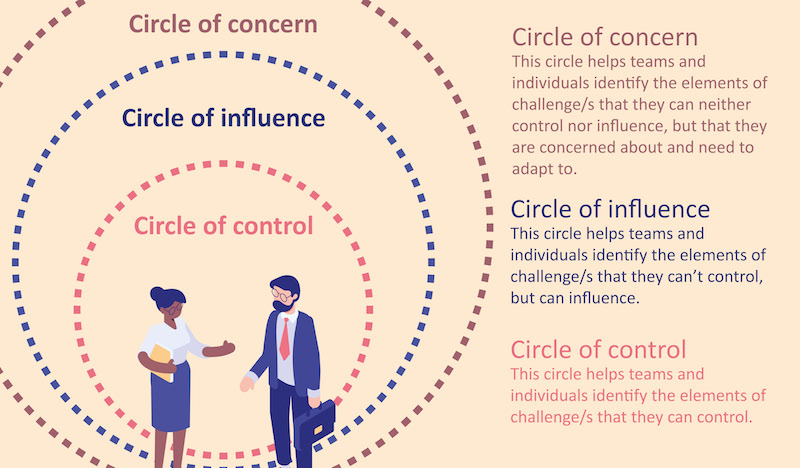News & Views

Putting teachers in control: The importance of decision-making to staff wellbeing
How much time do you spend stressing about something over which you have little or no control? Do you often become irritable about events that you’re unable to influence? For example:
- ‘I’m so stressed. There’s a traffic jam. I’m going to be late for school.’
- ‘I wish I was taller: I wouldn’t feel inadequate when dealing with the boys in Year 11.’
- ‘I love my daughter, but it must be so much easier for teachers who don’t have children. They don’t have to do their own school run!’
Emotions and control
Emotions – how we feel and react to those feelings – are part and parcel of what makes us human. But how do you respond if the organisation you work for – your school – assumes excessive control over your professional life? What do you do if you are often excluded from decision-making? When we support schools to build a culture of staff mental health, we encounter staff who have limited control and are rarely involved in decision-making. We see the impact through a lack of morale, low job satisfaction, stress and sadly, in some cases, resignations.
Burnout and lack of control
Christina Maslach is a world authority on occupational burnout. In her book with Michael Leiter, Banishing Burnout: Six strategies for improving your relationship with work, she identifies six factors that lead to burnout:
- work overload
- lack of control
- lack of reward
- lack of community
- lack of fairness
- conflict of values.
The risk of burnout increases with the more factors you experience. While most teachers cite work overload as the main reason for resigning, Maslach’s view is that work overload, by itself, will not produce burnout. If the other factors are not in play, a high workload can be tolerated.
Why a lack of involvement in decision-making contributes to burnout
Leiter and Maslach (2005, p.71) state:
‘When control’s the problem, you’re not the one making things happen. Rather than acting, you’re being acted upon. It’s frustrating and demeaning. Too many demands make you tired, but this makes you mad. You deserve the authority that comes with respect. You’ve earned it. Your experience and commitment to this organization ought to be worth something.'
Maslach identifies the main reasons for employees’ lack of control:
- Micro-management: you are told what to do for most of your day.
- Ineffective leadership: the people telling you what to do are not well-organised themselves and/or believe that leadership is about giving instructions.
- The members of your team are not cooperative or collaborative and are therefore unproductive. Perhaps you are a member of several teams. If leadership is ineffective, most of your teams will likely be like this.
Are you in control?
Try this exercise. Draw two circles on a sheet of landscape A4 paper, one inside the other. In the inner circle, write what you have control over in school. In the outer circle, enter what you have little or no control over.
Which of the circles contains the most entries? If it is the outer circle, you need to take action. Even if your inner circle dominates, you might be able to act to diminish or remove aspects of your job over which you have limited or no control.
The teachers’ mental health charity Education Support adds a ‘circle of influence’ to my diagram to identify issues that you can affect but not control.
Download Education Support’s free guide to control.

Taking control
- First, identify which of the issues in the outer circle most impacts your mental health.
- Prepare a one-page action document to discuss the issue that you have identified.
- Meet with the member of staff who has most influence over the issue. In most cases, this will be the headteacher or your line manager. (You could also be the headteacher, tackling undue control by your governors, executive headteacher or CEO.)
Outcome
The issue is resolved or partly resolved. As the person whose mental health is being affected, only you can decide whether the resolution is effective.
Preparing the action document
The aims of the one-page action document are to:
- Discuss it with the person who can give you more control.
- Summarise the issue.
- Propose a solution.
- Ensure the meeting focuses on the issue and is not diverted from its purpose.
- Enable you to manage your emotions.
Use these headings:
- The issue
- How the issue is affecting me
- Proposed solution
- The impact of the proposed solution.
Expand on your heading with bullet points, no more than three in each section.
You can download a completed example of a one-page action document on marking from the Teach Well Toolkit Vault of resources available to member schools and staff.
How to request a meeting
Email the person you would like to meet:
Dear [Name]
I would like to meet with you at a convenient time to discuss [the issue] as it is affecting my [state briefly how the issue is affecting you. You expand on this, using the one-page action template].
Please see the attached document which sets out my concerns and a proposed solution.
Best regards
[Your name]
How to approach the meeting
- Take two copies of the one-page meeting document with you: one for you and one for the person you are meeting.
- Allow the other person to start the meeting.
- Try to use the one-page action document to discuss the issue in order.
- If the other person departs from the document or becomes personal or aggressive, gently ask if you can discuss the next point in your document.
- At the end of the meeting, offer to make a summary of what has been discussed or agreed: ‘Would it be helpful if I made a summary of our meeting for us both?’
After the meeting
If you succeed in achieving more control or full control, celebrate! If you are unsuccessful, ask for a further meeting, again using the one-page action template.
What if the person doesn’t agree either to the first or second meeting?
If this is indicative of how leadership retains control and it is affecting your mental health, it might be time to consider moving to a new school. If your school is damaging your mental health, you have only three options:
- Change yourself
- Change your school.
- Leave your school.
Unfortunately, many teachers are choosing option 3. Their school is making them unwell and they assume that all schools are like this. This is particularly true of early career teachers (ECTs) who have limited experience of different schools. Victoria Hewett, in her wonderful book, Making it as a Teacher, describes how a lack of professional control led to burnout. She was on the verge of leaving the teaching profession when a friend said, ‘Try just one more school’. She went on supply at another school and loved it. So much so, that she secured a permanent post there and went on to become head of department. In a situation in which she had limited control, Victoria made a decision that changed her life.
A lack of control causes unhappiness, mental ill-health and even burnout. Your involvement in decision-making in your school is that important. Our Staff Wellbeing Award provides a useful resource for boosting staff resilience in schools.
About the author

Steve Waters is a wellbeing and mental health consultant and founder/CEO of the Teach Well Toolkit. He is also the author of the Staff Wellbeing Award and ‘Cultures of Staff Wellbeing and Mental Health in Schools’ (2021).